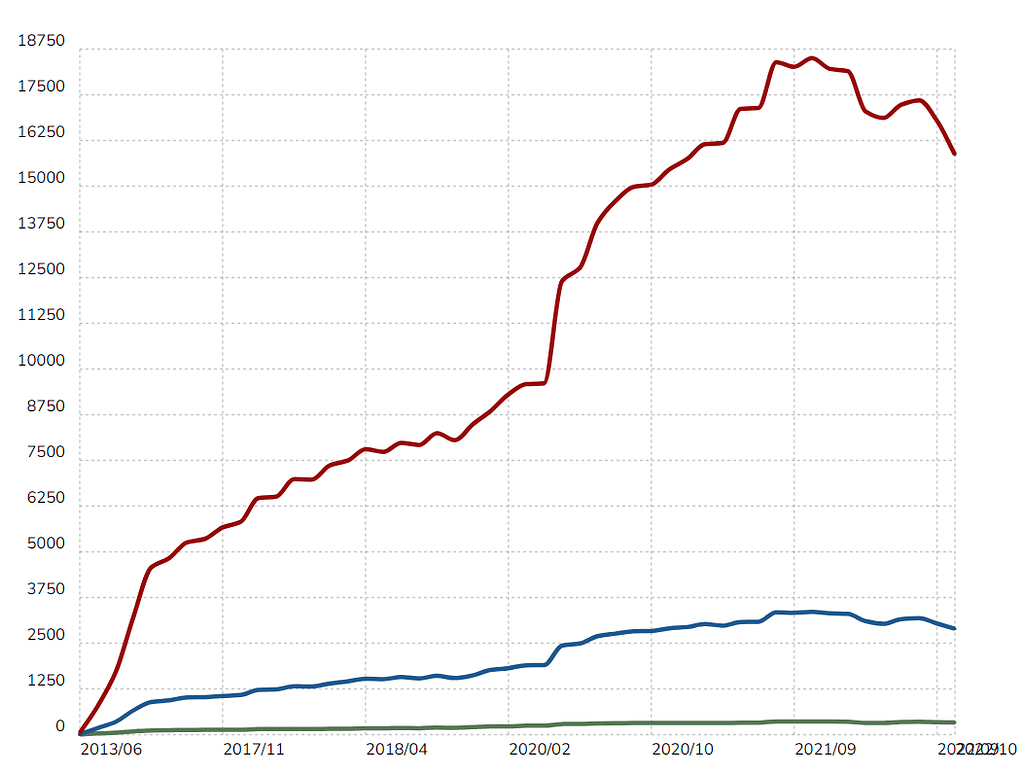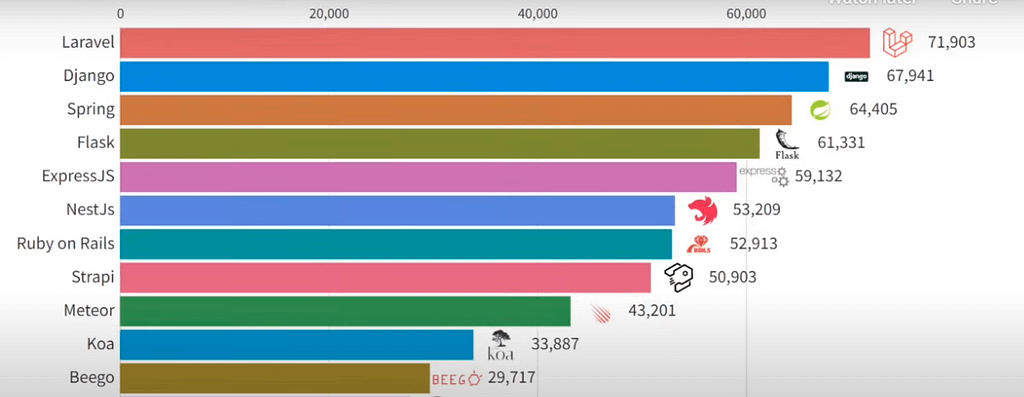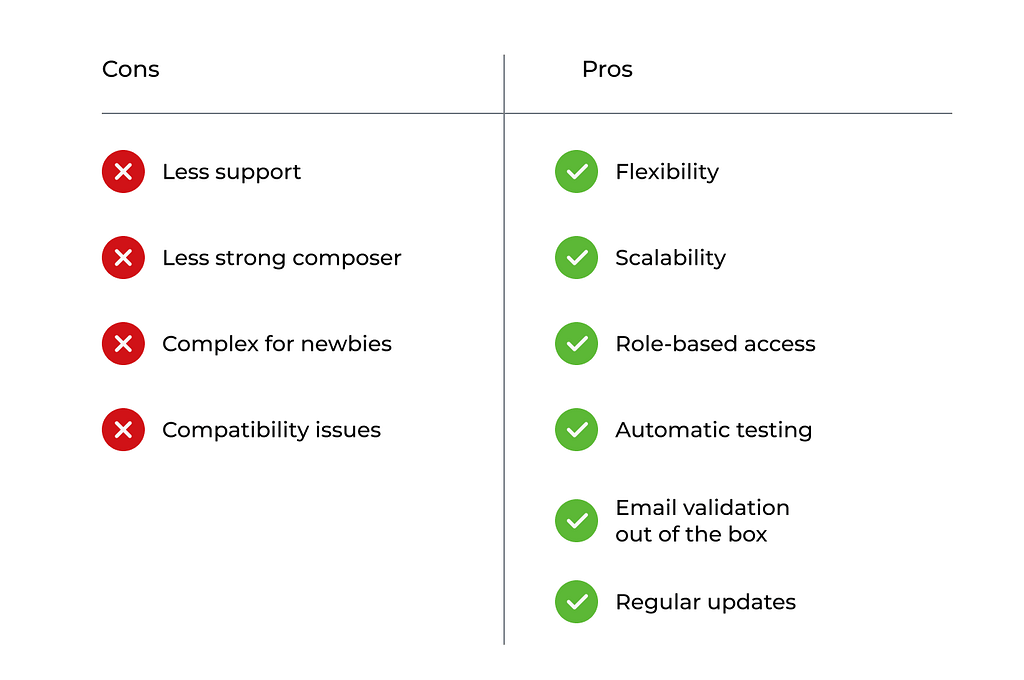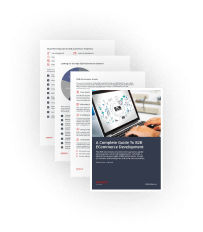Laravel is a free and open source framework for creating both personal projects, such as blogs, and enterprise-level sites for large companies. Its popularity is growing globally year by year.

In this post we’ll consider why building an eCommerce project from scratch using Laravel is rational.
What Is Laravel?
Laravel is an open source PHP framework specially designed for building complex apps and websites. The framework makes it possible to simplify authentication, routing, sessions, caching, application architecture and database work, which leads to a reduction in the time for the implementation of MVP and the launch of the project.
It was developed in 2011 and further maintained by Taylor Otwell in his attempt to produce a more feature-rich alternative to the CodeIgniter framework. Laravel architecture pattern is majorly based on Symfony. Laravel is written in PHP and is used to develop apps based on the MVC pattern. MVC (Model – View – Controller) is a scheme for distinguishing application data and control logic into three separate components: model, view, and controller. Modification of each component under such a scheme is carried out independently, which simplifies the study and rapid creation of application prototypes. Many consider Laravel to be one of the most popular MVC frameworks.

Need more details about Laravel-based development?
Companies That Use Laravel

Laravel is widely used by absolutely different companies both for the back- and frontend purposes. The list of businesses using it is endless. Let’s just mention such names as:
- Pfizer, the largest pharmaceutical company
- BBC, the oldest broadcasting organization
- Liberty Mutual Insurance, a well-known insurance company from the US
- Ratio, an innovative Fintech software company from the UK
- About You, a fast-growing eCommerce site from Germany that allows customers to access over 150,000 products available on their platform
- TourRadar, an international travel company that offers booking and marketing solutions for hotels and tour operators
What Is Laravel Used For?
Laravel suits a variety of apps: be it a CMS, an eCommerce site or an ERP system. With Laravel, you can not only implement a standalone system, but also develop a separate part – a subsystem, which in the future can be integrated into the whole project. For example: you can create an accounting system or an order cost calculator.
Look at the software list where Laravel was used to build a part of the system, namely, the reporting subsystem:
- Invoice Ninja – an invoicing and billing software that uses Laravel as its primary framework. It has a reporting system that allows users to generate reports based on various parameters, such as clients, invoices, payments, etc.
- Snipe-IT – an IT asset management system that leverages Laravel as its backend framework. It has a comprehensive reporting system that enables users to generate reports on assets, licenses, warranties, and more.
- CMS Airship – a content management system that uses Laravel in a powerful, organized, and secure platform for building and managing websites. It has a reporting system that allows users to analyze visitors’ behavior, track page views, and track sales.
There are several online stores with price calculators on Laravel available on the internet, which assist in offering personalized quotes in real-time to clients. These calculators enable customers to select product configurations, shipping options, and additional features before making a purchase. These websites use Laravel as the backend that handles all the business logic involved in calculating and displaying the price.
Here are some examples of Laravel-based online stores with price calculators that may be of interest:
- PrintPlace, a store providing online printing services with printing calculators
- FineAwards, custom awards, trophies and plaques with price calculator
- UPrinting, store offering customizing and printing professional marketing materials, stickers, labels, pacing, and promo products
- Raymour & Flanigan furniture store with their own room planner
Why Use Laravel Framework For Web App Development?
What’s the point of Laravel for web developers? There is a number of benefits:
- MVC architecture. This allows you to separate the presentation and the logic of the application and, ultimately, to develop new applications and their components faster.
- Automatic testing. This ensures that the application updates will not affect its functionality.
- Fast integration. Laravel easily integrates via API with other convenient tools, expanding its capabilities. You can connect, for example, Redis, a caching system, to the framework, which will allow you to configure the storage of cached files on the server and, ultimately, increase the performance of the application.
- Security and vulnerability protection. Laravel is considered one of the secure PHP frameworks. Laravel technology itself helps protect applications from common hacks such as SQL injection, cross-site queries, and cross-site scripting.
- Efficient user authorization and authentication logic. Laravel has all the settings to control user access to the application depending on the role in the project.
- Mail server and sending notifications to users by mail. Laravel provides default servers such as SMTP, Sendmail, and Spart Post. They allow you to send notifications through local and cloud services, which is very convenient.
- Command scheduler. It can be used to efficiently schedule emails to be sent to all users or clean up spreadsheets at the end of the day.
Top 10 Laravel Features That Make It Popular

Laravel has retained its rather high position in the top frameworks thanks to its great features. The release of version 3 brought the popularity to the framework with such features as Artisan, the Command Line Interface, support for the database system and migrations. Since then, Laravel has obtained the following features:
- URL routing: feature allows showing all the link’s contents within the current webpage without redirecting to the link. The user doesn’t have to wait for the page loading to view the link content.
- Eloquent ORM. The object-relational mapping feature offers a great syntax facilitating the users’ work with database objects and relationships.
- Message queue system, a feature that helps users run tasks in the background and not to overload the system.
- IoC Container. It helps handle class dependencies automatically, without configuration.
- Template engine allows creating layouts with dynamic content. Users can insert a finished widget with the help of CSS and JS codes.
- Artisan, a command line that enhances performance excluding repetitive tasks. Programmers, for example, can create database structures with a built-in skeleton code and save time and efforts
- Pre-installed libraries including the object-oriented ones that make the coding process easier for developers.
- Database seeding is used for populating database tables with the chosen data used on the application testing.
- Migration tools to create indices, tables, and databases
- Support of multiple file systems, both cloud and local, like Amazon S3, for example.
The Popularity of Laravel Over Other PHP Frameworks
There is no perfect framework for software development. Choosing the right technology stack will depend only on your project requirements and needs. Let’s compare Laravel with some of its main competitors:
Laravel vs PHP
Laravel is actually a PHP web application framework. It is built on top of the PHP programming language, providing developers with a set of tools and resources that make it easier to build web applications quickly and efficiently. PHP, on the other hand, is a scripting language which is used to create dynamic content on the web.
Essentially, Laravel is an extension of PHP that provides additional functionality, making it easier to write clean, scalable, and maintainable code. It provides a number of features out of the box, such as built-in user authentication and routing.
Yii2
Yii2 is a modern web app framework on PHP. It has a modular architecture, which gives developers the flexibility to choose the components they need for their project. Some of the features of Yii2 include caching and RESTful API. However, there are some differences that set Laravel apart from Yii2:
- Laravel has a more intuitive syntax than Yii2
- Laravel has a more powerful ORM than Yii2
- Laravel offers more out-of-the-box functionality than Yii2
- Laravel has a faster development cycle than Yii2
- Laravel offers better security features than Yii2
Symfony
Symfony includes a number of reusable PHP libraries. Thanks to its scalability, it suits better complex projects. The Symfony advanced tools and features simplifies modification into Java or C#. Although Symfony consumes less memory and is faster, programmers state that it is harder to learn it.
Read more: Laravel Vs Symfony: Choosing The Best PHP Framework
CodeIgniter
It better fits simple and scalable web app development. CodeIgniter is a minimalist framework assisting lightweight PHP developers. CodeIgniter has faster performance, but as compared to Laravel, it is less robust and has more limitations.
Laravel Advantages And Disadvantages

Let’s start with the cons as the advantages have been told a lot before.
Disadvantages:
- It has less inbuilt support when compared to other frameworks like Django or Ruby on Rails.
- Laravel’s composer is less strong as compared to other web frameworks.
- Many methods involved in reverse routing are complex for newbies.
- Compatibility issues: as Laravel constantly evolves, it may have compatibility issues with previous versions, which can create issues for developers.
Advantages:
Despite all these drawbacks, it is still a popular framework thanks to the following pros:
- Flexibility
- Scalability
- Role-based access
- Automatic testing
- Email validation out of the box: the developer does not need to spend time creating this useful email verification tool functionality to keep email protected for new users of the application.
- Regular updates that remove accumulated vulnerabilities
Popular Combinations in Laravel
Laravel is also appreciated for its ability to combine with other frameworks. By combining frameworks, you can apply the power of both. Let’s examine some examples:
- Laravel plus Vue: VueJS allows the Laravel devs to create new frontends without reloading the pages every time the application is updated. Besides, this combination helps handle updates effectively thanks to virtual DOM in Vue that instantly responds to pages without loading the app performance.
- Laravel plus Angular: the latter provides developers with enhanced performance, better frontend and responsiveness to the user in terms of feedback.
Laravel in eCommerce Development
There are lots of options for using Laravel for eCommerce development. Below we present special development cases that Simtech Development dealt with:
- Automation systems. We had a case when a customer requested to automate legal processes in his organization. We used Laravel to create a hosting client admin panel and a conversion booster app. The choice of platform was obvious: all these projects are highly loaded and operate with a large amount of data. Laravel showed itself in them from the very best side. Data is processed quickly and systems can be easily upgraded in the future.
- Reporting system. There is also a large amount of data and an emphasis on performance. A reporting system for an online store built on Laravel could include various reports and analytics related to the store’s performance, such as sales reports, inventory reports, customer behavior reports, and marketing reports. These reports can help store owners identify areas for improvement, track progress towards business goals, and make informed decisions about their online store.
- System for cost calculation. For example, we have developed an ingredient cost calculator. Our client produces cakes and wants the cost of the finished product to be calculated automatically. After entering all the ingredients, the order is sent to all suppliers. Another example is a manufacturer of disposable cups who wants an order to be accepted in the storefront, and the cost of materials calculated on the backend. The complete order is sent to production after all inputs have been done. In all these cases, we envisaged Laravel as the main framework for the app development, since the calculation of the individual units making up the end product is not included in the CS-Cart logic from the very beginning.
The Future of Laravel Web Development in 2023 and Coming Years
Web apps and sites built on Laravel evolve rapidly together with the technology. In future, we’ll see more sites with:
- IoT (Internet of Things) integration
- Better user interface and micro-frontends
- Chatbots
- Blockchain innovation
- Hashed text
Even now, you can see an example of our Laravel development services where we helped our customer to secure data and digitize legal processes with the Laravel technology. You can find it here.
If you are still in doubt whether to join top online projects shaping the future of electronic commerce, we can help you choose a proper technological stack thanks to the Ecommerce Architecture Design service. Our experts will analyze your requirements to make sure that the Laravel platform is the right choice for your business.
Conclusion
If you are in doubt about which framework to base your project on, you can always refer to the services of our business and system analysts. They will analyze your requirements, apply your business logic to the capabilities of the chosen framework, and if it is more rational in your case to use Laravel, they will include this in your project cost breakdown.
Another reason to work with us – We will expertly select a technology stack depending on the needs of a particular project including the cutting edge technologies and tools.
Frequently Asked Questions About Laravel
What is included in the Laravel ecosystem?
Laravel has a vast ecosystem of tools and packages that are built by Laravel experts and developers. These tools and packages help developers to speed up the development process, improve application performance, and add functionalities to their Laravel projects.
Laravel ecosystem includes:
– Laravel Forge: a server management tool that provides a simple and easy-to-use interface for deploying Laravel projects on servers.
– Laravel Envoyer: a deployment tool that helps developers deploy Laravel applications to production servers without downtime.
– Laravel Mix: a wrapper around Webpack and provides an easy way to compile and optimize frontend assets like CSS and JS.
– Laravel Cashier: a package that provides an easy-to-use interface for integrating payment gateways like Stripe and Braintree with Laravel applications.
– Laravel Telescope: a debugging tool that provides insight into the requests, exceptions, and logs of Laravel applications.
– Laravel Horizon: a queue management tool that provides a dashboard for managing Laravel queues.
Laravel Valet: a development environment tool that provides a lightweight and fast development environment on macOS.
How to use Laravel?
Laravel is a PHP framework that facilitates web application development with its elegant syntax, easy-to-use tools, and modular architecture. To start using Laravel, you need to have a basic understanding of PHP, MVC pattern, and some command-line knowledge. Additionally, you’ll need to install some prerequisites such as PHP, Composer, and MySQL to get started.
Once you have installed all prerequisites, you need to install Laravel by running the following command via terminal: composer create-project –prefer-dist laravel/laravel [project-name]The above code will install a new Laravel project under a specified directory.
Next, you can start creating routes, views, controllers, and models by using Laravel’s built-in command-line tools. Laravel provides a command-line interface known as Artisan. You can use Artisan to create boilerplate code and manage the application.
Here is a useful resource to learn more about Laravel.
What is the current version of Laravel?
The latest Laravel version is 10. It was released in February 2023.
What are the Laravel 10 new features?
Below are some of the new features introduced with the release of Laravel 10:
– the minimum version of PHP is v8.1
– the new package Laravel Pennant
– called validation rules
– own type declarations
What projects does Laravel suit?
Projects where there are:
– Big Data processing
– High loads
– Distributed systems
This may include:
– eCommerce sites on CS-Cart that need integration with a non-eCommerce system
– Large and long-term projects requiring scaling and further refining in the future
– Projects not related to eCommerce
Is it possible to use Laravel for eCommerce site building?
Laravel can be used to create an eCommerce site, but all the standard features will have to be recreated from scratch. This makes sense if the project is large, long-term, has a medium or large budget, requires further scaling and adding new functionality or other systems.
Development of an eCommerce site from scratch on Laravel for such projects is proved economically and technically, because:
– Laravel is more flexible than CS-Cart
– Laravel has fewer restrictions. CS-Cart has restrictions on the block structure and process logic. For example, if you take a checkout, it will work exactly as intended and hardwired into the code by the CS-Cart developers. The Laravel structure and logic can easily be changed to fit the needs of the project.
– The project on Laravel is easier to manage. After a few years, the investment in such development begins to bear fruit. Since Laravel is a flexible framework, it is easier to maintain it in the long run, for example, to integrate ready-made functionality that has just appeared on the market. Development on CS-Cart is more difficult to maintain after years, as the platform is less flexible. With a lot of integrations and custom add-ons created by various developers, CS-Cart becomes a clumsy monster after several years of active development. New functionality that does not fit the architecture of the platform becomes difficult to implement.
How can Laravel be used for mobile app development?
The PHP Laravel framework is also capable of building a mobile app. You can use Laravel to build APIs that can be used by mobile app clients written in any language, or alternatively, you can use Laravel to build the entire backend of your mobile application. Laravel also provides the Eloquent ORM (Object-Relational Mapping) that makes it easier to work with databases in your mobile application.
Can Laravel be used for chatbot creation?
Laravel is a popular PHP framework that provides various features and tools for web development. One of the features included in Laravel is the ability to create chatbots. Chatbots are automated programs that can simulate conversations with users through messaging platforms like Facebook Messenger, Skype, or Slack.

